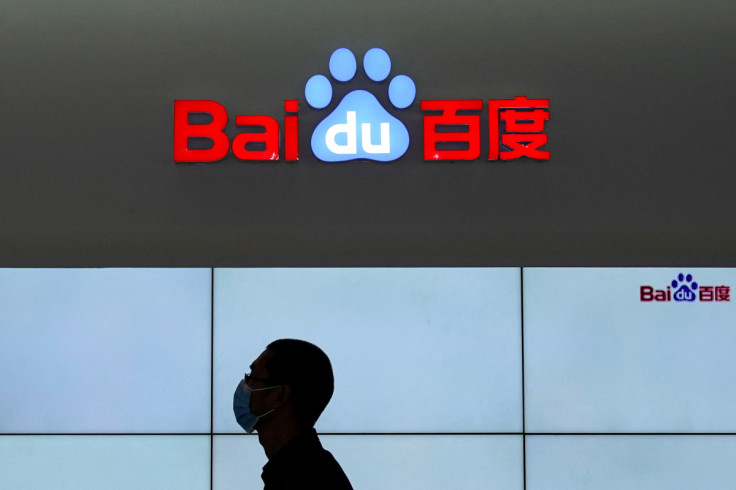Baidu's ChatGPT Rival Ernie Bot Surpasses 100 Million Users
US-based AI startup OpenAI's ChatGPT reached 100 million weekly active users in November last year.

Baidu recently announced that its ChatGPT-like artificial intelligence (AI) product called Ernie Bot has surpassed 100 million users.
It is worth noting that the Ernie Bot draws its power from an internally developed large language model (LLM), which uses enhanced representation through knowledge integration.
Designed to compete with AI chatbots like OpenAI's ChatGPT, Microsoft Bing and Google Bard, the Ernie Bot is capable of generating text, images and videos like its more popular counterparts.
Unlike the abovementioned AI-powered chatbots, Ernie can handle English queries to a lesser extent and primarily operates in Mandarin Chinese. It requires a Chinese mobile number for user registration.
In Mandarin Chinese, the app is called Wenxinyiyan. While Baidu's plan to launch the Ernie Bot initially caused concerns in the tech space, the Chinese tech giant's AI chatbot has now reached more than 100 million users.
🚀 Thrilling news for AI enthusiasts and tech mavens! Baidu's AI Ernie Bot has hit a milestone of 100 million users! 🎉 This impressive feat showcases not only China's rapidly growing tech landscape but also the potential for AI to become an integral part of our daily pic.twitter.com/mhFCGubqX2
— Flixfront (@flixfront) December 30, 2023
However, a CNBC report points out that Baidu hasn't confirmed whether the Ernie Bot user numbers were active or for a specific time period. Nevertheless, the report confirms Baidu shares closed three per cent higher in US trading this year.
Moreover, Super Clue ranked the Ernie Bot, which was only released to the public in August, as the top Chinese AI Chatbot. By introducing a new AI Law on generative AI, China has become one of the first countries to regulate AI.
Similarly, the country's top internet watchdog, Cyberspace Administration of China, has also introduced a set of guidelines on generative AI. It will be interesting to see whether these laws will be followed. Meanwhile, North America and the UK are still gearing up to pass laws on generative AI.
What do we know about the Ernie Bot so far?
The Ernie Bot is an outcome of years of research and industry practices by Baidu. The Ernie Bot, which managed to beat ChatGPT on some metrics earlier this year, can generate multiple modes of output.
Aside from this, the Ernie Bot can interact in dialogue, reason with knowledge and create content. The AI-powered bot is based on ERNIE (Enhanced Representation through Knowledge Integration) and PLATO (Pre-trained Dialogue Generation Model) series models.
The bot boasts a slew of key technologies such as dialogue enhancement, retrieval enhancement, knowledge enhancement, prompt learning, reinforcement learning with human feedback and supervised fine-tuning.
At #WAVESUMMIT, Baidu CTO Haifeng Wang outlined:
— Baidu Inc. (@Baidu_Inc) December 28, 2023
- PaddlePaddle: 10.7M devs in Dec 2023, now serving 235K enterprises, with 860K models built
- ERNIE 4.0: 32% performance surge in the past 2 months
- ERNIE Bot: user base exceeds 100M
Thanks to all participants for the journey! pic.twitter.com/T7DVuDqDHB
The last 3 technologies are generally used in this type of LLM, which has been applied in ERNIE and PLATO and has been further refined in Ernie Bot. The first 3 are innovations built on Baidu's technological advantages and will play a key role in the bot's future growth.
To recap, Baidu unveiled the Ernie Bot in March but failed to get approval for mass rollout until late August. It is worth noting that several local players received the green light around the same time.
Last month, Alibaba launched the latest version of its AI model called Tongyi Qianwen to go toe-to-toe with Microsoft and Amazon. TikTok parent ByteDance also offers a chatbot called Doubao.
As of Friday morning, Doubao ranked second in Apple's app store in China in the free-to-use productivity category, CNBC reported.
Tencent and Alibaba have been focusing on AI products for business partners lately but both companies offer chatbots to the public in China. Tencent's bot, for instance, is available in WeChat messaging and social media app.
Is Ernie Bot better than other ChatGPT alternatives in China?
In a recent test by a think tank affiliated with the Xinhua state news agency, Xinhua Institute, the Ernie Bot ranked top among ChatGPT-like chatbots offered by Chinese tech companies.
However, Ernie Bot trailed OpenAI's GPT-4 and GPT-3.5, which aren't available in mainland China. The original version of ChatGPT, which was made available to the public in November 2023, is powered by GPT-3.5.
Xinhua's test measured general capabilities such as basic language skills and intelligence. The test also measured the bot's ability to enhance the productivity of professionals such as researchers, lawyers, marketing specialists, designers, painters and journalists.
© Copyright IBTimes 2025. All rights reserved.






















